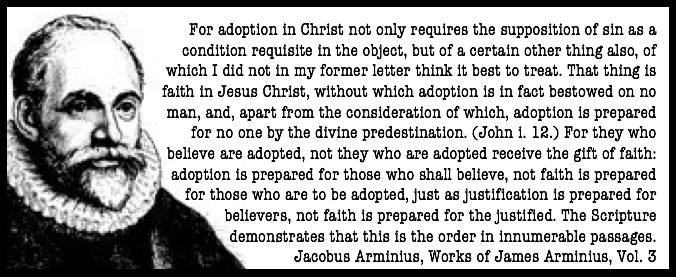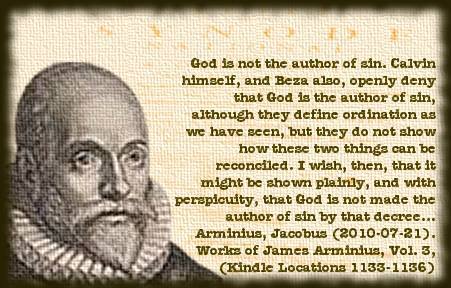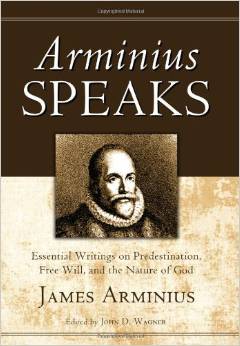Jacob Arminius
Jacob Arminius taught: “For God chooses no one unto eternal life except in Christ, who prepared it by his own blood for them who should believe on his name. From this it seems to follow that, since God regards no one in Christ unless they are engrafted in him by faith, election is peculiar to believers....” (Works of James Arminius, Volume 3, emphasis mine)
Arminius writes: “God can ‘previously love and affectionate regard as His own’ no sinner unless He has foreknown him in Christ, and looked upon him as a believer in Christ.” (Works of James Arminius, Volume 3, emphasis mine)
Arminius writes: “God acknowledges, as His own, no sinner, and He chooses no one to eternal life except in Christ, and for the sake of Christ. ‘He hath chosen us in Him,’ (Ephes. i. 4); ‘wherein He hath made us accepted in the Beloved,’ (verse 6). ‘Nor any other creature shall be able to separate us from the love of God which is in Christ Jesus our Lord.’ (Rom. viii. 39). ‘God was in Christ reconciling the world unto Himself.’ (2 Cor. v. 19).” (Works of James Arminius, Volume 3, emphasis mine)
Arminius on Gnosticism:
Jacob Arminius writes: “All the Danish Churches embrace a doctrine quote opposed to this, as is obvious from the writings of Hemmingius in his treatise on Universal Grace, in which he declares that the contest between him and his adversaries consisted in the determination of these two points: ‘Do the Elect believe?’ or ‘Are believers the true elect?’ He considers ‘those persons who maintain the former position, to hold sentiments agreeable to the doctrine of the Manichees and Stoics; and those who maintain the latter point, are in obvious agreement with Moses and the Prophets, with Christ and his Apostles.’ … The preceding views are, in brief, those I hold respecting this novel doctrine of Predestination.” (Arminius Speaks, p.56, 57, emphasis mine)
Arminius explains: “The charge of holding the Stoic and Manichean doctrine, which is made by some against you, is not made by them with the idea that your opinions entirely agree with that doctrine, but that you agree with it in this, that you say that all things are done necessarily.” (Arminius Speaks, p.206, emphasis mine)
Arminius adds: “Such indeed is the state of the matter in Pelagianism and Manicheism. If any man can enter on a middle way between these two heresies, he will be a true Catholic, neither inflicting injury on Grace as the Pelagians do, nor on Free Will as do the Manichees. Let the refutations be perused which St. Augustine wrote against both these heresies, and it will appear that he makes this very acknowledgement. For this reason it has happened, that, for the sake of confirming their different opinions, St. Augustine’s words, when writing against the Manichees, have been frequently quoted by the Pelagians; and those which he wrote against the Pelagians, have been quoted by the Manichees. This therefore is what I intended to convey, and that my brethren may understand my meaning, I declare openly, ‘that it will be quite as easy a task for me to convict the sentiments of some among them of Manicheism, and even of Stoicism, as they will be really capable of convicting others of Pelagianism, whom they suspect of holding that error.’” (Arminius Speaks, pp.363-364, emphasis mine)
Jacob Arminius writes: “This is my opinion concerning the Free-will of man: In his primitive condition as he came out of the hands of his Creator, man was endowed with such a portion of knowledge, holiness and power, as enabled him to understand, esteem, consider, will, and to perform THE TRUE GOOD, according to the commandment delivered to him. Yet none of these acts could he do, except through the assistance of Divine Grace. But in his lapsed and sinful state, man is not capable, of and by himself, either to think, to will, or to do that which is really good; but it is necessary for him to be regenerated and renewed in his intellect, affections or will, and in all his powers, by God in Christ through the Holy Spirit, that he may be qualified rightly to understand, esteem, consider, will, and perform whatever is truly good. When he is made a partaker of this regeneration or renovation, I consider that, since he is delivered from sin, he is capable of thinking, willing and doing that which is good, but yet not without the continued aids of Divine Grace.” (The Works of Arminius, pp. 252–253)
As I see it, anyone can submit to God, confess their sins before Him and say, “Jesus, remember me when You come in Your kingdom!,” such as with the thief on the cross. (Luke 23:42) However, in order to live the Christian life of knowing God’s will, seeking God’s will and following God’s will, one must be made into the Born Again, regenerated “new creature” (2nd Corinthians 5:17), as described by Paul.
Jacob Arminius responds to a “sinister report” regarding Eternal Security:
“For I never…taught any thing contrary to the word of God, or to the Confession and Catechism of the Belgic Churches. At no period have I ceased to make this avowal, and I repeat it on this occasion….Yet since a sinister report, has for a long time been industriously and extensively circulated about me…and since this unfounded rumor has already operated most injuriously against me, I importunately entreat to be favored with your gracious permission to make an ingenuous and open declaration….
[Articles were circulated] as of they had been my composition: when, in reality…they had neither proceeded from me, nor accorded with my sentiments, and, as well as I could form a judgment they appeared to me to be at variance with the word of God…
Twice I repeated this solemn asservation, and besought the brethren ‘not so readily to attach credit to reports that were circulated concerning me, nor so easily to listen to any thing that was represented as proceeding from me or that had been rumored abroad to my manifest injury….
My sentiments respecting the perseverance of the saints are, that those persons who have been grafted into Christ by true faith, and have thus been made partakers of his life-giving Spirit, possess sufficient powers [or strength] to fight against Satan, sin, the world and their own flesh, and to gain the victor over these enemies—yet not without the assistance of the grace of the same Holy Spirit. Jesus Christ also by his Spirit assists them in all their temptations, and affords them the ready aid of his hand; and, provided they stand prepared for the battle, implore his help, and be not wanting to themselves, Christ preserves them from falling. So that it is not possible for them, by any of the cunning craftiness or power of Satan, to be either seduced or dragged out of the hands of Christ….
Though I here opening and ingenuously affirm, I never taught that a true believer can, either totally or finally fall away from the faith, and perish; yet I will not conceal, that there are passages of scripture which seem to me to wear this aspect; and those answers to them which I have been permitted to see, are not of such a kind as to approve themselves on all points to my understanding. On the other hand, certain passage are produced for the contrary doctrine [of unconditional perseverance] which are worthy of much consideration….
I am not conscious to myself, of having taught or entertained any other sentiments concerning the justification of man before God, than those which are held unanimously by the Reformed and Protestant Churches, and which are in complete agreement with their expressed opinions…yet my opinion is not so widely different from [Calvin’s] as to prevent me from employing the signature of my own hand in subscribing to those things which he has delivered on this subject [of justification], in the third book of his Institutes; this I am prepared to do at any time, and to give them my full approval…. For I am not of the congregation of those who wish to have dominion over the faith of another man, but am only a minister to believers, with the design of promoting in them an increase of knowledge, truth, piety, peace and joy in Jesus Christ our Lord.” (quoted by Dave Hunt in What Love is This?, p.92, taken from The Works of James Arminius, Vols. 1 & 2, translated from the Latin by James Nichols)



